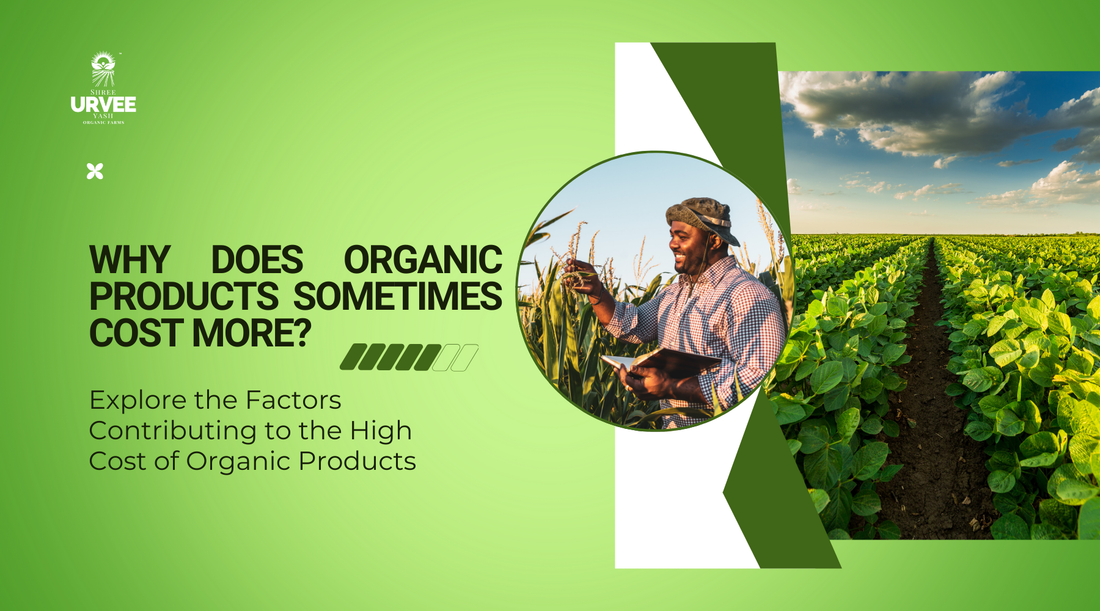Organic products in India are increasingly sought after by health-conscious and eco-aware consumers. With the rise of clean eating, people prefer natural and chemical-free food and sustainable farming in India. By definition, organic farming “prohibits the use of synthetically produced agro-inputs” (such as chemical fertilizers and pesticides) and relies on natural methods to build soil fertility. In recent years, millions of Indian farmers have embraced these chemical-free approaches – one report notes that “millions of farmers in India have rejected chemical pesticides as part of a growing movement that favors natural alternatives.”. This shift toward sustainable, organic farming is great for health and the environment, but it also means each step in the supply chain involves extra care (and cost). So why do organic foods often carry a higher price tag? Below we break down the main factors and explain what you get for the premium.
Why Are Organic Foods More Expensive?
Several factors drive up the cost of organic products compared to conventional ones. Key reasons include:
Certification & Compliance: Organic growers must pay for organic certification, inspections and paperwork. These fees (for initial audits and annual renewal) can be quite high, especially for small farms. The extra administrative and testing costs are spread over a relatively small harvest, raising the price of certified organic produce.
Labor-Intensive Farming & Lower Yields: Organic farms often yield less per acre than conventional farms (for example, crops go on smaller plots or have lower output) because they avoid synthetic fertilizers and growth enhancers. Organic methods rely on manual labor for weeding, pest control (using biopesticides or companion planting), and soil-building practices. All that extra hands-on work – combined with naturally lower yields – means higher production costs per kilo of food.
Special Handling & Transport: Once harvested, organic produce must be kept strictly separate from conventional crops at every step. This means separate trucks, storage, and processing lines, often in smaller batches. Without chemical preservatives or ripening agents, organic foods are also more perishable. These factors increase packing, storage and shipping costs.
Soil & Ecosystem Investment: Organic farmers invest in soil health by using compost, cover crops and crop rotation. These practices build fertility over the long term but cost more upfront (more organic manure, seeds, labor). Organic prices also reflect environmental benefits not captured in conventional pricing – cleaner water, richer biodiversity and better rural livelihoods. In other words, the “true cost” of sustainable farming is partially built into organic prices.
Each of these factors – certification fees, extra labor, careful handling and sustainable practices – adds to the end price. When you buy organic, you’re essentially covering the real costs of farming that avoids chemicals and supports the ecosystem.
Where to Buy Organic Produce?
Today’s consumers have many options for finding organic food. Searching for “organic farms near me” can reveal local producers and farm stands in your area. Local farmers’ markets and community-supported agriculture (CSA) programs are great places to buy farm-fresh organic vegetables. Meanwhile, many online retailers deliver organic vegetables and staples directly to your door. For example, Urvee Organic Farms offers a convenient online shop where you can buy organic products – everything from millets and pulses to flours, oils and spices, all grown without harmful chemicals. When shopping, look for trusted organic certifications (like India Organic or NPOP) and read customer reviews. By choosing verified organic sellers, you ensure the produce truly meets the standard of natural and chemical-free food you expect.
Embrace Organic Living with Urvee
The next time you wonder why organic food is expensive, remember the many benefits it brings to your health and the planet. Paying a little extra covers the real costs of sustainable farming and a healthier ecosystem. If you’re ready to make the switch, consider exploring Urvee Organic Farms’ offerings. Discover the purity of nature with Urvee – “where every grain, pulse, and oil is a step towards a healthier you and a greener planet.” Browse the Shop to explore a wide range of certified organic staples you can order online. Each purchase from Urvee Organic Farms supports sustainable farming in India and brings truly clean, nutritious food to your table.

